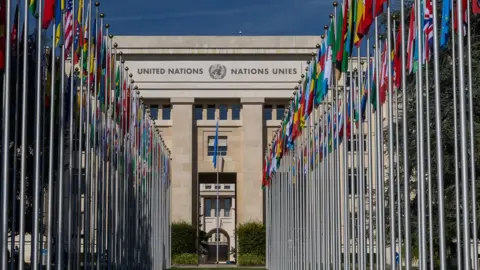Russia fails to rejoin UN's human rights council
 Reuters
ReutersRussia has failed to get re-elected as a member of the UN's human rights council.
The state was expelled from the top human rights body last April after its forces invaded Ukraine.
It had hoped getting a fresh three-year term would highlight divisions between UN member states over whether or not to keep supporting Ukraine.
But Bulgaria and Albania won the two seats allocated for Eastern European countries instead.
The vote came days after a Russian missile attack that killed 52 people in the north-eastern Ukrainian village of Hroza.
Russia received 83 votes in favour from the UN's 193 general assembly members, while Bulgaria got 160 and Albania got 123.
Earlier, Albania's ambassador Ferit Hoxha had said it was important for member states to show it was not ready to "take an arsonist for a firefighter".
Russia had promised to find "adequate solutions for human rights issues" and said it wanted to stop the body becoming an "instrument which serves political wills of one group of countries" - understood to be a reference to the West.
Diplomats said it was hoping to regain some international credibility after being accused of widespread rights abuses in Ukraine and inside its own borders.
Russia had claimed it would win the votes of many member states - particularly developing nations - in the secret ballot, suggesting they privately sympathised with Moscow but avoided doing so in public to avoid angering Western states.
Russia is said to have campaigned aggressively, offering small countries grain and arms in return for their votes.
Moscow's ambassador to the UN, Vassily Nebenzia, accused the US of leading a campaign to stop them from returning to the council.
The state was suspended from the human rights council in April 2022 with 93 members of the UN general assembly voting in favour, 24 against and 58 abstaining.
The council will consist of the following countries from 2024, for three years: Albania, Brazil, Bulgaria, Burundi, China, the Ivory Coast, Cuba, Dominican Republic, France, Ghana, Indonesia, Japan, Kuwait, Malawi and the Netherlands.